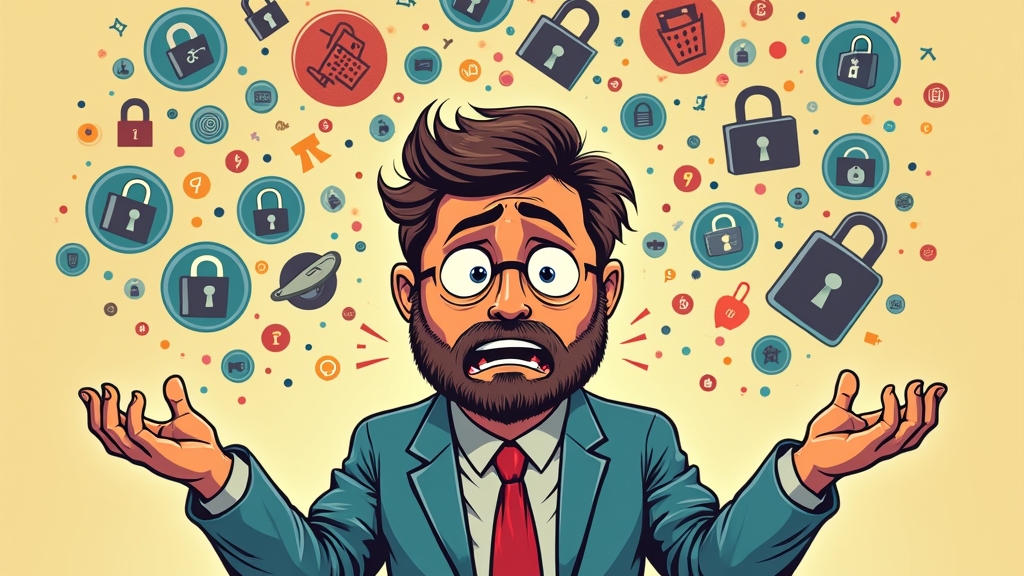**Breaking: Nation That Can’t Remember Its Netflix Password Somehow Expected to Secure Data Like CIA Operatives**
In a shocking turn of events, experts have once again reminded the public that safeguarding personal data is critically important—just as the average citizen finally memorized steps to reset a forgotten password… only to forget them again.
A recently released list of “10 ways to protect your data” has sparked widespread panic, confusion, and a deep existential dread among everyday internet users. The suggestions, ranging from “enable two-factor authentication” to “implement cryptographic strategies like you’re starring in your own spy thriller,” were met with blank stares and desperate Googling for the phrase “cryptography, but easy.”
“It’s like they think we’re living inside Mission Impossible,” said Carol Grady, a 43-year-old suburban mom still using her dog’s name as her Gmail password since 2009. “I downloaded a VPN last month because I saw it in some TikTok ad, but honestly? I only turn it on when I want to watch British Netflix.”
The guide also strongly recommended the use of steganography—a technique for hiding files within images, messages, or structures. However, public reception of this advice has been lukewarm at best. “Stegan-what-now? I have a hard time hiding Christmas presents from my kids,” said Mike Jenkins, a part-time software developer and full-time browser of conspiracy forums. “I guess I could technically hide my files inside a picture of my dog if I knew how, but I’m honestly just hoping the hackers get bored before they find out I’ve been illegally torrenting early 2000s boy band albums.”
The article also stressed the need for heavy investments in data privacy protocols like generative AI monitoring and identity management solutions. Unfortunately, this proved to be more aspirational than practical for the general public, given that most people can’t even manage their Facebook privacy settings without accidentally making a post visible to their high school nemeses.
“Frankly, I think I’d need a PhD just to understand how any of this sh#% works,” admitted Ethan Waller, a college student whose bank password is literally “password123.” “And if AI is going to protect my data, why do I even need to do anything? Can’t it just handle all that for me? I’m too busy ignoring Grammarly’s suggestions to read another goddamn cybersecurity tutorial.”
Perhaps the most hysterical piece of advice was the suggestion to create “strong, unique passwords” for every account. In a country where the most common passwords are still “123456,” “password,” and “letmein,” the phrase “strong and unique” might as well be asking people to generate a password by solving quantum physics equations.
Other baffling tips included regular system updates (because who doesn’t love restarting their computer for the 12th time this week?), the use of something called “Zero Trust architecture” (which, honestly, also describes Gen Z’s relationship with capitalism), and good old-fashioned “access control.” What access control looks like for someone trying to keep their toddler from emailing the boss a string of emojis remains unclear.
Indeed, critics have called this “ultimate” guide tone-deaf in an era where people casually accept cookies from untrusted websites as if they’ve been offered free dessert at a Michelin-star restaurant. “Sure, I’ll give you my data,” one user quipped while clicking “Accept All” on a shady-looking pop-up ad. “Just let me see which celebrity I’d be if I were a loaf of bread.”
Despite the outcry, cybersecurity experts maintain that people need to take these steps seriously or risk losing sensitive information to bad actors. “If you’re not doing proactive data encryption while simultaneously scrambling passwords like you’re defusing a bomb during the final seconds of an action movie, you might as well hand your social security number to the nearest teenager with a Wi-Fi connection,” said Dr. Linda Clarke, an expert who presumably doesn’t realize humans are still figuring out how to print PDFs.
As for Grady, she’s developed a more realistic philosophy. “Look, the hackers are welcome to my Target shopping history and random Amazon purchases. If they can figure out my mom’s maiden name, good for them. Honestly, at this point, I’m just hoping they pay my overdue internet bill while they’re snooping around.”





